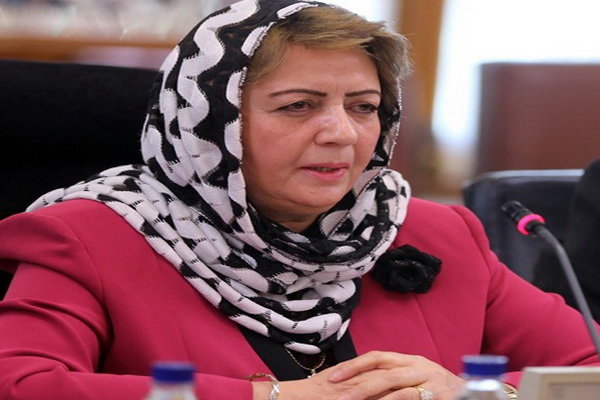Mrs. Hediyeh Khalaf Abbas is visiting Tehran heading a delegation. Somayyeh Khomarbaghi of Mehr News International Correspondent found an opportunity to interview her about the situation in Syria and diverse other issues including Iran’s contribution to the country:
What messages would selection of a female representative to the speakership of the parliament for the first time in Syria implicate?
The selection highlights the democracy in Syria and the civilization country enjoyed; it also communicates the message that the country had been in a right track toward democracy and progress; however, in other countries, women are disenfranchised, they would not be elected to the parliament, and even ballot boxes are quite absent from the political process. The same countries would boast of advancing democracy in Syria. Syrian Parliament fosters the diversity of partisan spectrum, and selection of me to the speakership just belies the claims of other countries lamenting the absence of democracy in Syria.
How would you evaluate US-Russian agreed cessation of hostilities in Aleppo and US targeting of a Syrian government forces convoy in Deir Ezzor?
Events in Syria since the crisis engulfed the country clearly show that the US had been working to distort the realities and coordinating terrorists; Deir Ezzor episode is such a telling example. More than 45 minutes of unremitting strike would demonstrate that it had by no means been inadvertent, but well-organized and deliberated attack. The episode also exposed Washington’s defiance of the ceasefire signed with Russia, while Syrian and its friends have been complied by the rules of ceasefire, but terrorist groups breached the agreement in Aleppo, Hama, Deir Ezzor, and elsewhere.
Russian foreign minister Lavrov has communicated to Syria apologies by Washington in Deir Ezzor episode. Is the apology intended to signal anything to Damascus?
Washington’s apologies would remain unavailing as long as the US actions fail to translate to concrete action and as long as Washington brings serious changes to her policy of backing terrorists; the apology would not be given due weight by Syria if the US does not prove in action coordination in fighting terrorism and ends provision of arms and logistics to terrorists.
How would you see visit to Iran and meetings with country’s officials in achieving anything which helps Syrian crisis?
The visit is part of a general framework of friendship and cordial relations between Iran and Syria, and sought to improve coordination in fight against Takfirist-Wahhabist front backed by the US and its mercenaries in the region. It also sought non-political objectives, namely, establishment of Iran-Syria Friendship Association and deepening bilateral ties in economy, culture, and science and technology.
After 5 years of conflict in Syria, what would you think would be a real solution to the crisis?
We assume for Syria two steps and work to achieve: 1. Fighting terrorism and restoring pace and stability to the whole country through defeating extremists; and 2. Political phase which includes negotiation of all Syrian sides engaged in the crisis without any foreign intervention. Only Syrians should decide about their political future and we have achieved some success on the ground and in national reconciliation, and believe this would help the political path further.
Interview by: Somayyeh Khomarbaghi
